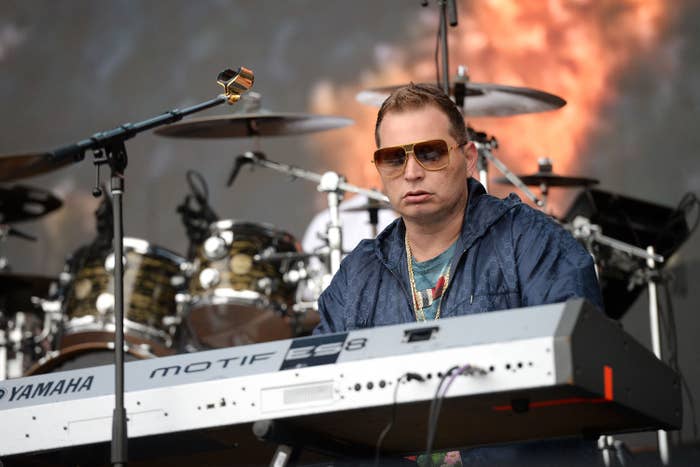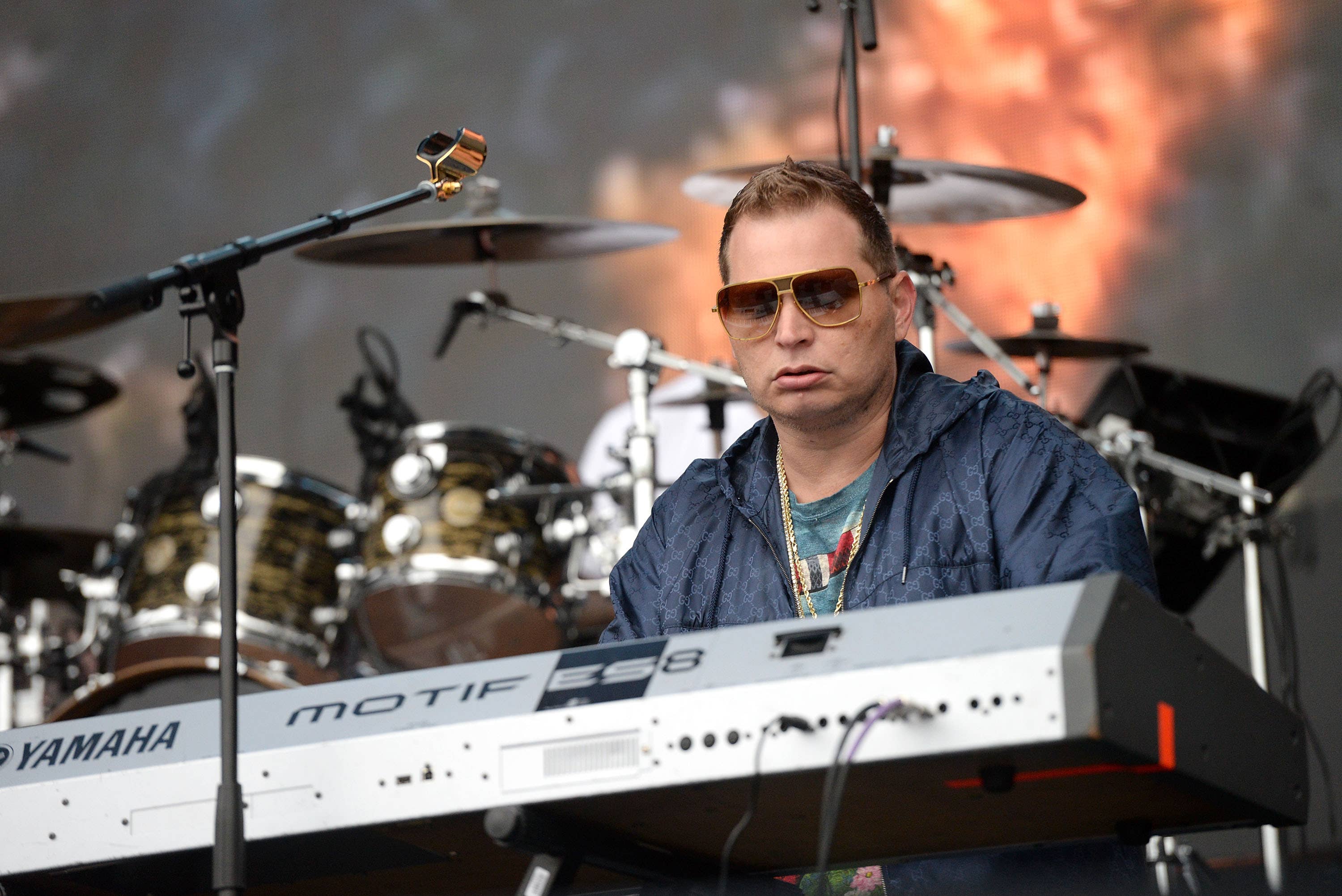
From the menacing keys of “Still D.R.E.” to the thunderous strings of “Candy Shop” and “Lean Back” to the downcast arpeggios of “Cry Me a River,” few musicians have defined the sound of a decade quite like Scott Storch. The one-time keyboardist for The Roots became a Dr. Dre acolyte, and eventually the go-to sonic architect for an era when rap seized a hold of the mainstream it has yet to relinquish.
Along the way, Storch accrued vast wealth and prominence—as well as a nasty cocaine habit that caused him to blow through virtually all of the fortune. But after years of struggles, the hitmaker is married, sober (save for weed), and appears on track for something of a career renaissance.
Having become a rap fan in the mid-2000s, Scott Storch’s production was some of the first that really captivated me. The way he could tuck an irresistible melody into every song while still giving his vocalist room to shine remains a rare skill, and his versatility in working with everyone from The Game to Juvenile to Beyoncé is highly underrated.
Storch’s fall from grace was something that always saddened me, particularly as hip-hop grew more melodic, and the industry seemed better suited for his particular style than ever before. Thankfully, he’s back in the studio working with artists like A Boogie Wit Da Hoodie, Thutmose, Swae Lee, artists with the kind of chops that he can showcase through his production.
Still Storch, a new documentary from British filmmaker Rollo Jackson, tells the story of Storch’s peaks, valleys, and current trek back to the top through the man’s words and his jaw-dropping laundry list of hits.
Jackson, who directed Stormzy’sGang Signs & Prayer film and Jamie xx’s “I Know There’s Gonna Be (Good Times)” video, brings plenty of style and flare to Storch’s saga, but he also recognizes the power of simply capturing Scott in his element, presenting his compositions on a grand piano in a dimly-lit room.
Seeing Storch at the film’s premiere, surrounded by friends, his wife Florence (who he credits with helping pull him out of his spiral), and a particularly boisterous Fat Joe, was comforting. His infectious and accessible production was a gateway into hip-hop for thousands of young fans, and seeing him on his feet and back behind the keys is a reminder of what music almost lost.
Following the film’s premiere, we spoke to Jackson about getting the documentary made, the songs he absolutely needed to include, and what it’s like to talk music in the back of Scott Storch’s Rolls Royce.
When did you first get in touch with Scott about making this film?
We shot the film at the end of last year, and it was during summer last year that Joseph [Patel] at VEVO got in touch with me. He’s someone I’ve known since he was at FADER working as a commissioner there, and he was highly involved in the Stormzy film I did. For years before that, I talked to him about the idea of the film, which he was really into, but between us it sort of never happened and we slept on it for a long time.
Our first forays to contact Scott directly didn’t result in anything. We didn’t have a direct link; he knew a few people, I had half a link. It’s funny, those guys can be quite insular, and it’s sort of about who you know, and emailing the address at scottstorch.com never came to anything either [Laughs].
But then last year, Joseph got in touch with me and said, “You’ll never guess what. Someone I’m working with happens to be an old friend and has worked with the guy who now manages Scott and has been for the past year or so. It’s this guy Steve Lobel.” Steve was keen to do something for Scott and get his story out there and get it told in a good way, and so we had a few phone calls, which were quite surreal for me, having these conference calls with Steve and Scott.
What was he like as an interview subject?
I think he was prepared for the questions I was going to ask, it’s not like it was a live TV interview or anything, and we had done a lot of groundwork beforehand. In a totally true way, I’m coming to this as a fan and someone who enjoyed the music the first time around and feels like there’s a story to tell...I wasn’t looking to expose any lascivious rumors or anything like that, it was just painting a portrait in a way that was truthful, but also found a good admiration as well as honesty from his point of view. I was really struck by his eloquence.
The first time we met, we had a really long dinner with me and his management and the guys from VEVO and the guys from Somesuch. At the dinner, I came away and totally surprised, I thought this would be someone who was only tuned into hip-hop and hip-hop production, and we ended up talking about [electronic DJ] Josh Wink, who he knew from Philadelphia, which was a very left field reference for me. I wouldn’t have put those two together in the Venn diagram of musicians. It was obvious straight away that he had a much broader circle of knowledge than in a way even he himself lets on, and that people give him credit for.
Did that figure into why you wanted to showcase so much of him playing piano?
Absolutely. I think there’s no clearer way to show an innate talent than someone just doing it, and also there’s a nice contrast in a way to someone sitting down at a grand piano, and then cutting to a Fat Joe video or a 50 Cent video or something like that, and saying that this all came from the same place.
What was it like for you as a fan to be sitting there and watching him go from playing songs like “Let Me Love You” to “Candy Shop” to “Still D.R.E.” back to back to back?
It was amazing. I knew that he had made all of those songs, but for me there were some key moments I wanted him to hit as well. Different tempo songs so we could get different moods across, and we had to choose which ones we used in video form and which ones we chose of him playing the piano.
In between takes, he would be like, “Hey, what about this one? What about this one?” They weren’t totally relevant to the documentary and would have probably cost us an extra $2 million in clearance, but that in itself was incredible...It’s almost like a piano player filling in at a bar, someone names a tune and he can play it.
The music in the film is really impressive and must have been quite the undertaking to clear. Were there any specific records that you knew you really wanted in there, whether it was a favorite of yours or something that you think helps tell Scott's story?
“Still D.R.E.” was an obvious one, because that was kind of the turning point in his own career, I think he’d be willing to say. That was a real pivotal moment for him. For me, the songs that I loved were “Cry Me a River” and Mario’s “Let Me Love You." We got quite lucky, there were a couple of painful decisions about what we couldn’t use, but I ticked most of the boxes, put it that way. The ones that I just named were the ones I really wanted.
Mario was interesting, because he was relatively unknown, and there was a whole thing that Scott talked about: that single wasn’t even going to be on the album, and then they shelved the album for a long time, and then they had a new person come in to the record label and they were like, “Oh my God, what are you doing? You’re mad, this should be the single.” It became the lead single and it was No. 1 for weeks and weeks. That was also quite a big moment.
There were a lot of moments in the movies where you employed difference creative visual flourishes. You had dancing scenes, elegant cars, and you even had him playing with Thutmose on a helipad. How do those different elements help illustrate the message of the movie? How did you decide to add them?
The helicopter pad was a reference to hip-hop videos, something that’s kind of ridiculous and bombastic but visually striking. It was almost a stunt, I was like, “Can we get a grand piano on a helipad?”
IT WAS ABOUT NOT PUTTING HIM ON A PEDESTAL, BUT ISOLATING HIM A LITTLE BIT...IT'S THE OLD CLICHE OF COMING OUT FROM BEHIND THE DESK.
That was a stunt where I thought, "What’s another way of contrasting him in the dark studio setup?" And it’s probably the type of scenario where you’re more likely to see the artists he’s produced for, you’re more likely to see a rapper on a helipad than a producer, so that kind of gave him the limelight. Then, I was aware that I didn’t want it to be interview, archive, interview, archive, so I wanted to divide up some of the songs into ones that didn’t make sense to play on the piano, like “Lean Back” for instance, and I wanted to represent those in another way. We do include the video on that one, but I thought the idea of having a dancer was something that I liked as a thread, as another kind of glue that made sense with that music...
The car is another hip-hop trope and we had fun with it and broke it down and used it in a slightly unobvious way. Rather than having someone driving, it’s just kind of a palette for us to show words and lyrics and things like that.
Breaking down and isolating those tropes sort of mirrors how the entire film examines Scott as an artist in his own right and not just a component in all these hit songs.
It was about not putting him on a pedestal, but isolating him a little bit as well, and it’s the old cliché of coming out from behind the desk. I didn’t want to interview him in a classic studio environment, he’s done that before.
Speaking of isolation, Scott’s basically the sole interview in the film, and he does talk about how people turned their backs on him when he went through his period of deep addiction. Did you reach out to other artists for interviews? Did people not want to participate or did you want to keep it to just being as much of Scott as possible?
We very consciously decided to not go down that route, and when the project opened up, we realized that because of the amount of time that we were going to have with him, and with the other projects that I was involved in at the time, and the budget that we were going to have and the way I wanted to approach the film, we weren’t going to be able to film for months and months and months. That would have been amazing, but also exhausting, and maybe a slightly more obvious root to go down.
Lots of people at the premiere were talking about how they could have easily watched a feature-length version of this. Was there anything you had to leave on the cutting room floor that you wish had been included?
There’s nothing that didn’t make it in there, apart from a couple of clips of him playing tracks that we couldn’t use for licensing reasons. Most of the stuff we shot we were pretty careful and well prepared, because we had such a dense shooting schedule. In an alternate reality, I’d have had more money and more time and hung out with him more because he’s very fun, and maybe we could have gone really deep into his production process with current artists and stuff like that, but I think we hint at that with the Thutmose performance and things like that.
What was he like as a guy to hang out with and spend a few days following around?
Very nice, constantly quipping and making jokes. He’s his own person. I think he’s probably happiest when he’s working. He seems like someone who is very at ease with himself and obviously wasn’t in the past. I think he’s maybe a shyer person than people realize. Not diva-ish or anything like that.
One of the first things we did were the shots when we were driving in his car. He was heading to the studio, and it was about an hour long drive—as everything is in L.A.—and he just rattled through other peoples’ music. He played music off his phone for an hour, which was such a pleasure. It was pretty surreal to be sitting in the back of his Rolls Royce with him just cycling through his playlists. That in itself kind of sums everything up. He was putting on everything from Sister Nancy, which was fairly unexpected, to other reggae, to classic hip-hop that he really liked.
One thing that I noticed looking through your filmography is that you’ve worked with a lot of producers, people like Squarepusher and Jamie xx. What interests you specifically about producers as subjects and collaborators?
I think I like producers and artists. I just like music, full stop, whether it’s people who sing or people who write music or both. I tend to be drawn to trying to make films about music that I like, because I’m interested in what that music would look like on the screen, or the lifestyle of the people making it, like in Scott’s case, or the emotions that it brings up. Or where the narrative lies in lyrics, like with Stormzy. I think there are different qualities depending on the artist or producer. I probably wouldn’t have made the same film in the same way about another artist.
One last thing, in the course of filming the movie and spending all this time with Scott, did you ever see him without his sunglasses on?
[Laughs] I think I did a couple of times, a couple of times. Maybe to clean them. I’m trying to remember if when we ate together he was wearing them then, which was 11 at night and inside.

